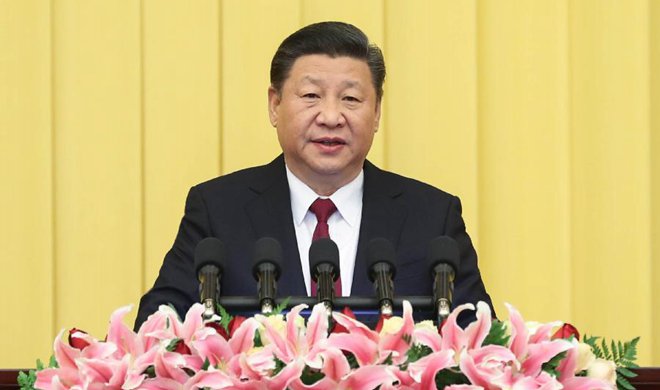BEIJING, Dec. 29 (Xinhua) -- In today's China, a QR code is a must-have for retailing businesses. From grand department stores to food stands on street corners, they are put up everywhere to make things easier: by scanning the codes, people can pay for almost anything.
But it has also made things easier for scammers. QR codes are so accessible that a simple scanning of an unidentified barcode can lead to a loss of huge money or massive personal information leakage.
The popularity of QR code is only an example of the revolutionary changes brought by financial technology (fintech). In 2017, while people enjoyed better financial products and services, concern was also rising on risks and challenges.
CHANGING FINANCIAL LANDSCAPE
As a young market, China's financial firms have been quick to adapt their thinking to changing technology and business. After the explosive fintech growth in 2015 and 2016, relations between technological advancement and China's financial sector have grown even closer this year.
Business services group EY said in a report earlier this year that China is now in a leading position among 20 major markets in terms of fintech use in areas including money transfers, investments, borrowing and insurance.
"Fintech is making profound changes on the financial landscape," said Jiang Yang, vice chairman of the China Securities Regulatory Commission, China's top securities watchdog.
In Jiang's eyes, tech-based financial services are more accessible and inclusive, and have helped solve issues that have long baffled the industry.
For instance, while offering credit support for small and micro-sized enterprises who may not have enough collateral or sound balance sheets is still a headache for the banking sector, banks now can make better loan decisions by evaluating their conditions more precisely with technologies like big data and blockchain.
Traditional financial institutions have also moved to embrace such trends.
Baixin Bank, a direct bank jointly invested by China CITIC Bank and Chinese Internet giant Baidu, opened in November. It combines cloud computing, artificial intelligence, mobile Internet and other leading technology to offer financial services.
SECURITY CHALLENGES
Jiang also pointed out that regulators will face challenges in investor protection, market fairness and financial stability, stemming from fast-expanding fintech, which is particularly relevant in China as the country is strengthening control against financial risks.
The vice chairman said fintech had blurred the boundaries of regions, industries and markets. At the same time, the skyrocketing increase in transaction volume and faster transaction speed could spread risks and make them more destructive.
In September, authorities ordered a ban on Initial Coin Offerings, a controversial digital coin fundraising scheme, and shut down all virtual currency exchanges in the country, as the rapidly expanding market, attracting both innovators and scammers, spawned concerns over financial risks.
Chinese regulators have also specified new rules to clean up rampant peer-to-peer lending and an insecure cash loan market, which dealt a heavy blow to the stock prices of China's micro lenders in recent months.
"We cannot drop fintech for its security risks, nor can we ignore the security risks because technologies have brought so much convenience to the financial industry," said Hou Yunchun, former deputy director of Development Research Center under the State Council.
REGULATORY BALANCING
Facing the same regulatory issues, financial authorities across the globe have come up with many innovative solutions, of which regulatory "sandboxes" or "firewalls" are among the most popular methods.
For regulators, regulatory "sandboxes" allow them to test financial innovation in a controlled environment before they mature, so that new technologies and products can evolve without causing threats to the existing system.
"Similar to 'regulatory sandboxes,' in China, we have pilot projects for innovative products and technologies," said Fu Jianfeng, an associate researcher with the Ministry of Science and Technology, who now works with the local financial bureau in Chengdu, a western Chinese city.
He cited the pilot financial reform zone in the eastern city of Wenzhou, established in 2012 to try innovative financial services and regulatory practices.
To keep abreast with the latest developments and protect market order, the People's Bank of China (PBOC), China's central bank, set up a fintech committee to enhance research, planning and coordination in this field.
The PBOC has also moved to address practical situations. In the latest move, it ordered payment institutions to obtain proper permits to offer payment services based on barcodes, and said cross-bank barcoded-involved transactions must be channeled through the central bank clearing system or other legal clearing houses.
The central bank said it has always been aware of the delicate balance between encouraging innovation and controlling risks, and the new standards on barcode payment reflect that principle.

















